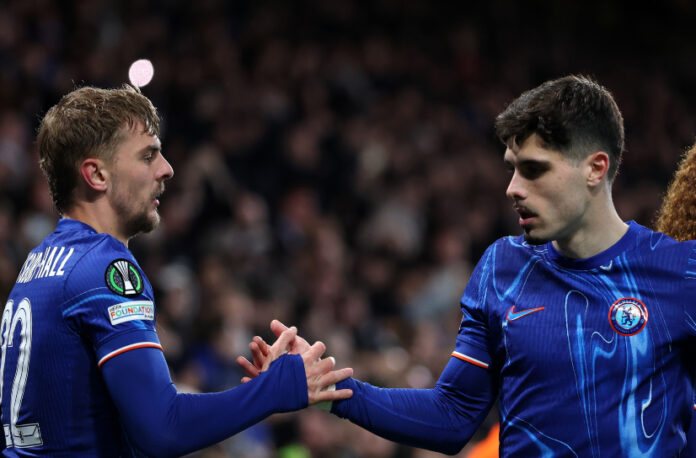Chelsea booked their place in the Conference League quarter-finals with a 1-0 win over FC Copenhagen, sealing a 3-1 aggregate victory. Despite the result, the performance left fans frustrated, particularly a lifeless first half with zero goal attempts. Cole Palmer’s introduction in the second half sparked improvement, with Kiernan Dewsbury-Hall netting the winner. However, Maresca’s tactical approach and Chelsea’s reliance on Palmer raise concerns as they prepare for tougher challenges, including a Premier League clash against Arsenal. Can Chelsea build on this result, or will their struggles continue?
Chelsea Edge Past FC Copenhagen to Secure Conference League Quarter-Final Spot
Chelsea secured their place in the Conference League quarter-finals with a hard-fought 1-0 victory over FC Copenhagen at Stamford Bridge, completing a 3-1 aggregate win. However, the performance left many fans and pundits questioning Enzo Maresca’s approach despite the positive result.
First Half Frustrations at the Bridge
The atmosphere at Stamford Bridge was one of anticipation as Chelsea, though competing in Europe’s third-tier competition, were expected to comfortably dispatch their Danish opponents. What unfolded instead was a first half that could generously be described as lackluster.
Chelsea began with some semblance of energy, but this quickly fizzled out, replaced by a prolonged period of uninspiring football. Most concerning was the complete absence of goal-scoring opportunities – the Blues failed to register a single shot on target or even an attempt at goal during the opening 45 minutes. This attacking impotence was reflected in their expected goals (xG) value of zero, a damning statistic for a side of Chelsea’s caliber.
The tactical setup employed by Copenhagen proved effective in neutralizing Chelsea’s attacking options. Their compact five-man defensive line presented a challenge that the home side seemed utterly incapable of solving. Only Tyrique George on the right flank offered any glimpse of creativity, with his occasional bursts forward providing rare moments of excitement in an otherwise forgettable half.
Meanwhile, big names failed to make an impact. Jadon Sancho remained virtually anonymous on the left wing, while Pedro Neto found himself well-marshaled by the determined Danish defense. The half-time whistle was met with a chorus of boos from the home supporters, making their dissatisfaction unmistakably clear.
Palmer’s Introduction Sparks Improvement
Recognizing the need for change, Maresca made two significant substitutions at the interval, bringing on Cole Palmer and Marc Cucurella. Despite reportedly recovering from illness, Palmer’s introduction proved pivotal in shifting the momentum of the match.
The breakthrough finally came in the 55th minute through Kiernan Dewsbury-Hall. Displaying determination and opportunism, the midfielder navigated through Copenhagen’s defense before slotting a low shot past the goalkeeper. This moment of individual brilliance provided the separation Chelsea needed and seemed to release some of the tension that had been building.
With the deadlock broken, Chelsea began to play with greater freedom. Palmer himself nearly doubled the advantage and ended his goal drought, but his effort narrowly missed the target. While Copenhagen had a late chance through Rodrigo Huescas, Chelsea managed the closing stages effectively to secure both the victory and quarter-final qualification.
Lingering Questions Despite Progression
The 1-0 win and subsequent quarter-final qualification (3-1 on aggregate) should be cause for celebration, but Chelsea’s performance has instead prompted fresh concerns about Maresca’s methods. The first-half display in particular highlighted worrying deficiencies in creativity and fluidity that cannot be overlooked.
Chelsea’s reliance on Cole Palmer has become increasingly evident. When the talented midfielder is absent or below his best, the team struggles significantly to create meaningful chances. This dependency raises questions about tactical flexibility and the ability of other squad members to step up when needed.
The Dewsbury-Hall Paradox
Kiernan Dewsbury-Hall’s match-winning contribution adds an interesting layer to Chelsea’s current situation. While his goal proved decisive, his overall role at Chelsea remains somewhat paradoxical. Despite thriving under Maresca during Leicester’s promotion campaign, Dewsbury-Hall has struggled to replicate that form since rejoining his manager at Stamford Bridge.
His position in the team becomes even more contentious considering he effectively replaced Conor Gallagher, who coincidentally scored for Atlético Madrid on the same night. Many supporters continue to question whether letting Gallagher depart was the right decision, especially given Dewsbury-Hall’s inconsistent performances.
The goal itself, while crucial, came more from individual determination than cohesive team play – perhaps symbolic of Chelsea’s current approach under Maresca.
Bridging Expectations and Reality
Following the match, Maresca emphasized Chelsea’s obligation to deliver trophies, acknowledging the club’s prestigious history. However, the disconnect between the manager’s vision and fan expectations was palpable, exemplified by the half-time jeers.
Chelsea now face a challenging Premier League fixture against Arsenal, where they’ll need a vastly improved performance to compete with their London rivals. In the Conference League, they await the winner of Legia Warsaw versus Molde in the quarter-finals.
While progressing in Europe is positive, serious doubts persist about Chelsea’s ability to truly “dazzle” and meet the high standards expected by their supporters. If silverware is the genuine ambition this season, the team must demonstrate significant improvement in both performance and consistency.
Looking Forward: Potential and Pitfalls
For Chelsea and Maresca, this victory over Copenhagen represents progress in terms of results but highlights considerable room for improvement in performance. The reliance on individual moments of brilliance rather than systematic team play remains a concern for a club with Chelsea’s aspirations.
The introduction of Palmer demonstrated his importance to the team, but also underscored the need for other creative outlets when he’s unavailable. Developing this tactical flexibility will be crucial as Chelsea navigate the remainder of their season across multiple competitions.
Defensively, Chelsea managed their lead effectively, but questions remain about their ability to break down organized opponents. The first half against Copenhagen exposed limitations in their attacking approach that more formidable opponents will surely look to exploit.
As Chelsea advance to the quarter-finals, they carry both the expectation of tournament favorites and the burden of proving their credentials. The Conference League represents a realistic chance for silverware – something Maresca and his players must capitalize on amid inconsistent domestic form.
For now, Chelsea progress with more questions than answers. The road to potential European glory continues, but improvements are needed if they truly wish to convince skeptics and satisfy the Stamford Bridge faithful. The coming weeks will reveal whether this narrow victory marks a stepping stone toward success or merely papers over persistent cracks in Maresca’s developing Chelsea project.
UEFA Conference League round of 16 second legs: Chelsea …



